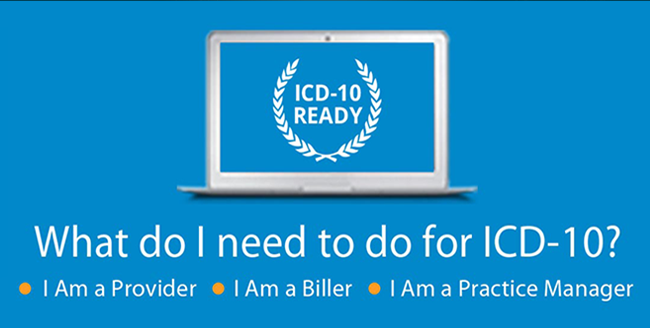In just a few months the new ICD-10 diagnostic codes will officially take effect, and physicians will be required to comply 100%, or risk not getting reimbursed. These changes to medical billing practices are expected to cause major disruptions to practices’ revenue flow.
So, what are health care providers to do? How can physicians and their staff become comfortable with 149,000 new codes, when they’ve only had to deal with 17,000 in the past? Sure, these additional codes will allow for greater detail and classification of diagnosis and more, but they will also, at least at the outset, confuse in-house billers, and that may cause claims to be denied. And no small practice can afford to have any claims denied.
With this in mind, here are some ways providers and their staff can prepare themselves for the ICD-10 transition:
I Am a Provider
As a provider, the first thing to understand is, that there will be an intense need for increased specificity within the documentation, once ICD-10 is in place. You and your staff will need proper training in how to adjust your documentation, so that it meets these new requirements. You most likely, will also need training related to any systems changes, especially if you have recently switched EHR systems.
You will need to do the following as well:
- Identify all current work processes that are using the old ICD-9 codes, such as: encounter forms and superbills, clinical documentation, EHR systems and practice management systems, quality reporting protocols, and contracts.
- Create a cheat sheet with all of your most-used codes, if you have to.
- Speak with your current practice management system vendor, to see if your contract includes upgrades. And, if you don’t currently have a vendor but are shopping for one, be sure to ask if they are ICD-10 ready.
- Next, you will have to get in touch with all of your clearinghouses, payers and billing services, to discuss implementation plans and set a date to test the systems.
- Determine how much training your staff will need. Identify and focus on the office staff who will need the most training.
- Make sure you’ve budgeted for all of the time and costs related to the ICD-10 transition. This should include expenses for training, software updates, and system changes.
I Am a Biller
Coding and billing staff will be responsible for evaluating a much larger code set. Billers must understand all of the new payer policies under ICD-10. In fact, the entire billing department will need to be trained on these policies, as well as any new procedures (think new appeals process), of which, there’ll be many.
Billers will also have to:
- Become familiar with all the system upgrades.
- Identify the current ICD-10 codes used the most, and put them in order of frequency.
- Once identified, make sure current documentation supports them.
- Learn the new codes most relevant to your provider, as well as the specific anatomical relationship each represents.
- Once you’ve completed this process for the most frequently used codes, move on to other specialized codes, that may be part of your daily routine.
- Notify the practitioner of the specific documentation that’s missing from current patient records.
- Perform a few test transactions with payers and clearinghouses, using the new ICD-10 codes. Find out when they will begin testing, and the days on which those tests are scheduled.
- Learn to fully understand the revenue cycle of your practice, so that once ICD-10 has been implemented you’ll know if it’s causing any problems. You’ll specifically want to evaluate your payer mix, determine what’s typical for your accounts receivable cycle, and examine your denied claims.
It’s also a great idea to work with your billing software vendor to make sure, that the ICD-10 codes you are most likely to use immediately upon transition, have been plugged into the software.
Make sure that your software vendor will be able to meet your new requirements, and is willing to give you all the planned updates and transition dates in writing.
I Am a Practice Manager
Not only will the practice managers have to oversee these ICD-10 implementations across all departments, they will also be responsible for revising any policy or procedure associated with tracking, disease management, or diagnosis codes. Additionally, they will need to make sure that all payer and vendor contracts are evaluated and updated, and that budgets have been created to reflect the need for new contracts, paperwork and software changes.
Everyone on staff will need a certain amount of training, it is the practice manager who will need to come up with a training plan, that is the most relevant to each staff member’s role. They will also need to consider the best medium for training, i.e., online, in-person or on-site training.
And finally, practice managers must be in charge of ensuring that there is strong and clear communication between all departments. Even with extensive training and support, to err is human, and mistakes will no doubt occur without effective and open channels of communication.
There is no indication that the ICD-10 deadline will once again be extended, so it is better to be prepared rather than hope for a miracle. Now is the time to gather staff and analyze how these significant changes will affect your practice, and to determine how best to prepare for them. If you haven’t done so already, get your staff trained, and recognize that this training will be an ongoing process. Though the clock is ticking, there is still some time left to prepare, and it is the preparation that will protect your revenue and cash flow, which is no doubt your biggest concern right now.
